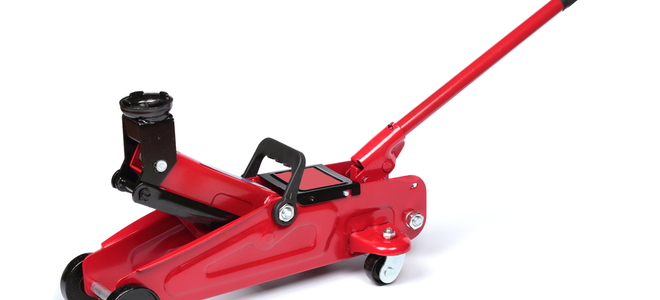
..............................................................................................................................................................
How to Repair a
Hydraulic Floor Jack
By Tim Bossie •
Reviewed by Rebecca Hollada
What
You'll Need
A
hydraulic floor jack is used to lift heavy vehicles to be able to work
underneath them. It works as a result of fluid being compressed through
cylinders on the jack.
As
the handle is pumped, the cylinders press the pressurized hydraulic fluid,
giving the force necessary to lift the vehicle.
When
a hydraulic floor jack is not operating properly, it can be repaired quite
easily with basic tools.
Step
1 - Clean the Device
Anytime
you are going to be working on, or maintaining, your hydraulic floor jack, it
must be clean before starting.
If
any type of debris or dirt gets into the hydraulic fluid, it can do a lot of
damage to the inside of the cylinders.
Use
shop rags to wipe down the cylinders thoroughly before you open any.
Step
2 - Remove Plug on Cylinder
When
this machine is not working properly, most of the time it is a failure in the
plug or dirt in the hydraulic fluid.
Look
for the rubber plug on top of the cylinder and use a screwdriver to carefully
pry it up. If the plug is damaged, you will need to buy a new one to replace it
later.
Step
3 - Drain Hydraulic Fluid
Set
up a bucket under the hydraulic floor jack and turn it so that the fluid drains
out.
Once
the cylinder is empty, look inside to make sure that there isn't any more
debris laying around that needs to be cleaned up. If there is some, blow it out
with some compressed air.
Step
4 - Replace Fluid
Once
the cylinder is clean, you'll need to put need to pour new fluid in with the
aid of a funnel. The amount you will use will vary depending on the size and
the make of the floor jack.
Regardless,
you want to make sure that the cylinder is full.
If
you do not have access to hydraulic fluid, you can use 5W-30 motor oil as a
substitute, but you should replace it with the correct substance as quickly as
possible.
Step
5 - Replace Rubber Plug
Check
the rubber plug, new or old, before you set it back in place. Clean it off with
a rag to make sure there isn't any dirt on it.
Then,
set it into the hole in the cylinder and press it firmly. The plug should be
seated flat without any type of wrinkle in it which can cause air to leak into
the cylinders.
Step
6 - Test
You
should not have any other problems once the fluid has been replaced, but to
make sure, you should test the floor jack several times before putting any
considerable weight on it.
Lift
the arm several times to make sure the pressure holds. Then, place the jack
under a vehicle and begin to lift it.
Make
sure the pressure is able to hold the weight before fully use it.
Tim Bossie
Tim is a contributing writer
for DoItYourself.com. He is a seasoned web writer and researcher with
experience working on a wide range of home improvement issues, and especially
enjoys learning about plumbing, car repair, and door construction.
Becky Hollada is a writer and editor with a decade of experience in
both print and digital media. After graduating with a BA in Literature and
Japanese from Bennington College, she started out pursuing work in fiction and
dove headfirst into the eBook publisher phenomenon. Working with a small
company required wearing many hats, so while she was copy editing novels, she
turned her hand to maintaining the company blogs and working with the marketing
teams on promotional material. This and her time volunteering at a small news
publication focused on video game journalism fed a growing interest in digital
media.
Now based in Los Angeles, she
specializes in both fiction and non-fiction content, with a portfolio spanning
a variety of genres, topics, and styles. She aims to use her work in fiction to
bridge the gap between reader and writer by exploring new angles to
traditionally dry and complex topics and using storytelling to bring
entertainment and accessibility to any subject matter.
Becky’s work has appeared on
Yahoo! Finance, MSN, DoItYourself.com, and Weddingbee.com, as well as a variety
of other publications. She has also worked in collaboration with a number of
brands such as Disney, Macy’s, Wayfair, Home Depot, and Osmocote.


No comments:
Post a Comment